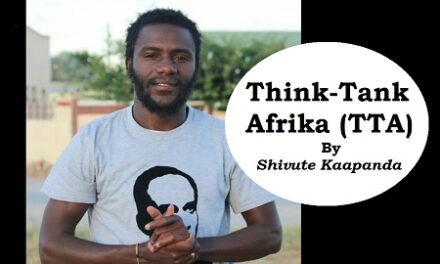Namibia’s 21st Century foreign relations perspective
By Shivute Kaapanda [Think Tank Africa)
As Dr. Anton Bosl would point out that Namibia is neither geographically nor politically an island or otherwise isolated but rather an integral part of Southern African Region, an active member of the African Union (AU) and a sovereign member state within the international community.
It is from this perspective that one would come to understand Namibian politics of independence and interdependence especially taking into account the pre-independence, independence and the post-independence era.
Namibia has always been embedded in social, historic, economic and political relations and interactions with its neighbors in the region and beyond. Foreign relations as an affair of international politics have always impacted on every citizen’s life because it determines the sustainability of the country and the economic perspectives of its citizens.
In educating Namibian citizens on international politics, it’s therefore relevant to reflect on the country’s foreign relations in order to gain a better understanding of the domestic economy.
With the introduction of the concept of nation-states and democracy as it was in the past, through international influence Namibia became a sovereign nation-state. The former colonial powers had determined the history, status and the management of Namibia’s foreign affairs, its norms, values and interests a as well as strategic objectives.
Namibia gained its sovereignty during a global epoch when hardly any challenge could be resolved anymore by countries acting unilaterally.
It’s therefore to be understood from this perspective that those preaching about independence based solely on the “barrel-of a gun narrative” are shallow political animals trying to survive on cheap political rhetoric, although the role of the barrel of a gun with regard to Namibia’s independence cannot however be ruled out entirely.
As an independent state represented by a government with Authority over a territory and its population, with the capacity to enter into and maintain relations with other sovereign states and supranational organizations, the package of international relations came by and it’s shaped by former colonial powers.
The existence of the international order was mainly shaped by the Second World War. Namibia’s foreign relations and the principles, policies and formulations on which those relations depend have been shaped significantly by the diplomatic and the armed struggle to achieve political independence.
South African historian Chris Saunders clearly pointed out on Namibia’s pre-independence diplomacy focusing on Namibia’s formal diplomatic activities by Namibians between 1945 until 1990. Saunders reminds us about the petitioning of Namibian traditional leaders before 1945 at the League of Nations the forerunner to the United Nations (UN) in Geneva.
Namibia’s pre-independence diplomacy was formative for its foreign policy as well as foreign relations in the post-independence period by providing identity as an element of political continuity and a firm foundation for its international standing.
It’s obvious that the drafting and crafting of the Namibian Constitution as the supreme law, its content and character, bows down to international standards set by former colonizers; despite the 1990 independence the colonial powers still have much say in Namibian economy and politics for as long as Namibia remains a child of the international community a reality we cannot ignore and live without.
Namibia’s former colonizers, who also happen to be the new-colonizers, have dismally shaped the strategic outlook of the country’s international relations.
Namibia’s (via SWAPO) historic diplomatic relations with China (via China’s Communist Party), the relationship between SWAPO with UNITA during the liberation struggle and later with MPLA, SWAPO’s relationship with the ANC of South Africa, ZANU-PF of Zimbabwe, and the persistent diplomatic efforts by SWAPO leaders which led to the adoption of the UN security council Resolution 435 in 1978 which via UNTAG paved way for independence in 1990 have all influenced our foreign policies and ultimately Namibia’s international/foreign relations.
Namibia is standing on a decades-old strong foundation of international relations which in many cases influence domestic policies in a manner that is negative and continues to perpetuate economic inequality.
Thus we really have a lot to do if Namibia ever has to change her foundation on foreign/international relations and the impact it has on the domestic economy.
[Shivute shaNandjila Immanuel yaKaapanda is a critical pan-African writer from Eyanda village in Namibia’s Omusati Region. He can be reached at: iskaapanda@gmail.com]






